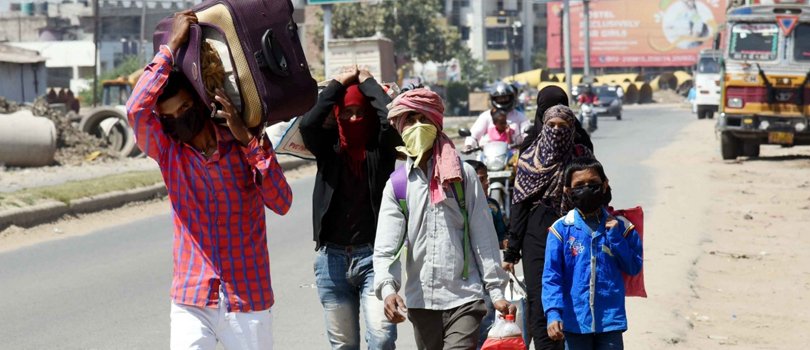GENEVA: About 40 crore workers in India working in the informal economy are at risk of falling deeper into poverty during the COVID-19 pandemic crisis. The International Labour Organisation (ILO) said in a report today that the COVID-19 pandemic is affecting 2.7 billion workers globally due to lockdowns.
COVID-19 is already affecting tens of millions of informal workers. In India, Nigeria and Brazil, the number of workers in the informal economy affected by the lockdown and other containment measures is substantial.
In India, with a share of almost 90 per cent of people working in the informal economy, about 400 million workers or 40 crore in the informal economy are at risk of falling deeper into poverty during the crisis.
ILO said that the current lockdown measures in India, which are at the high end of the University of Oxford’s COVID-19 Government Response Stringency Index, have impacted these workers significantly, forcing many of them to return to rural areas.
The report said that particularly in low- and middle-income countries, hard-hit sectors have a high proportion of workers in informal employment and workers with limited access to health services and social protection. Without appropriate policy measures, workers face a high risk of falling into poverty and will experience greater challenges in regaining their livelihoods during the recovery period.
ILO noted that the COVID-19 pandemic has further accelerated in terms of intensity and expanded its global reach. Full or partial lockdown measures are now affecting almost 2.7 billion workers, representing around 81 per cent of the world’s workforce.
Employment contraction has already begun on a large (often unprecedented) scale in many countries. In the absence of other data, changes in working hours, which reflect both layoffs and other temporary reductions in working time, give a better picture about the dire reality of the current labour market situation.
Using this approach, as of 1 April 2020, the ILO’s new global estimates indicate that working hours will decline by 6.7 per cent in the second quarter of 2020, which is equivalent to 195 million full-time workers.
The majority of job losses and declining working hours will occur in hardest-hit sectors. The ILO estimates that 1.25 billion workers, representing almost 38 per cent of the global workforce, are employed in sectors that are now facing a severe decline in output and a high risk of workforce displacement.
Key sectors include retail trade, accommodation and food services, and manufacturing. Workplace closures have increased so rapidly in recent weeks that 81 per cent of the global workforce lives in countries with mandatory or recommended closures.
Employment in countries with mandatory or recommended workplace closures represents 87 per cent of the workforce of upper-middle-income countries and 70 per cent of the workforce in high income countries.
COVID-19 is now also impacting the developing world, where capacities and resources are severely constrained. Through the massive economic disruption, the COVID-19 crisis is affecting the world’s workforce of 3.3 billion.







